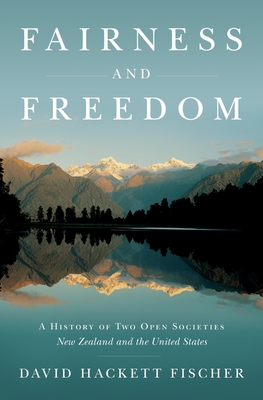Fairness and Freedom: A History of Two Open Societies: New Zealand and the United States

Fairness and Freedom: A History of Two Open Societies: New Zealand and the United States
Fairness and Freedom compares the history of two open societies--New Zealand and the United States--with much in common. Both have democratic polities, mixed-enterprise economies, individuated societies, pluralist cultures, and a deep concern for human rights and the rule of law. But all of these elements take different forms, because constellations of value are far apart. The dream of living free is America's Polaris; fairness and natural justice are New Zealand's Southern Cross. Fischer asks why these similar countries went different ways. Both were founded by English-speaking colonists, but at different times and with disparate purposes. They lived in the first and second British Empires, which operated in very different ways. Indians and Maori were important agents of change, but to different ends. On the American frontier and in New Zealand's Bush, material possibilities and moral choices were not the same. Fischer takes the same comparative approach to parallel processes of nation-building and immigration, women's rights and racial wrongs, reform causes and conservative responses, war-fighting and peace-making, and global engagement in our own time--with similar results. On another level, this book expands Fischer's past work on liberty and freedom. It is the first book to be published on the history of fairness. And it also poses new questions in the old tradition of history and moral philosophy. Is it possible to be both fair and free? In a vast array of evidence, Fischer finds that the strengths of these great values are needed to correct their weaknesses. As many societies seek to become more open--never twice in the same way, an understanding of our differences is the only path to peace.
PRP: 254.14 Lei
Acesta este Prețul Recomandat de Producător. Prețul de vânzare al produsului este afișat mai jos.
228.73Lei
228.73Lei
254.14 LeiLivrare in 2-4 saptamani
Descrierea produsului
Fairness and Freedom compares the history of two open societies--New Zealand and the United States--with much in common. Both have democratic polities, mixed-enterprise economies, individuated societies, pluralist cultures, and a deep concern for human rights and the rule of law. But all of these elements take different forms, because constellations of value are far apart. The dream of living free is America's Polaris; fairness and natural justice are New Zealand's Southern Cross. Fischer asks why these similar countries went different ways. Both were founded by English-speaking colonists, but at different times and with disparate purposes. They lived in the first and second British Empires, which operated in very different ways. Indians and Maori were important agents of change, but to different ends. On the American frontier and in New Zealand's Bush, material possibilities and moral choices were not the same. Fischer takes the same comparative approach to parallel processes of nation-building and immigration, women's rights and racial wrongs, reform causes and conservative responses, war-fighting and peace-making, and global engagement in our own time--with similar results. On another level, this book expands Fischer's past work on liberty and freedom. It is the first book to be published on the history of fairness. And it also poses new questions in the old tradition of history and moral philosophy. Is it possible to be both fair and free? In a vast array of evidence, Fischer finds that the strengths of these great values are needed to correct their weaknesses. As many societies seek to become more open--never twice in the same way, an understanding of our differences is the only path to peace.
Detaliile produsului










